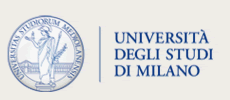Voi siete qui
- Home
- Digital library
- FAQ
FAQ
indice paragrafi
- What resources are available in the Digital Library?
- Are particular configurations required to access Digital Library resources?
- Are there training sessions on how to use the Digital Library?
- Who has off-campus access to the Digital Library?
- How can I access the Digital Library off-campus?
- Which Digital Library resources can I consult off-campus?
- I have forgotten the password for off-campus access: how can I retrieve it? (UNIMI users)
- I have forgotten the code for off-campus access: how can I retrieve it? (authorized CNR, INFN, INFM users)
- How can I create a personal account in the vLex database?
What resources are available in the Digital Library?
The Digital Library provides an integrated point of access to all electronic resources to which the University has subscribed (databases, electronic books and journals) as well as open resources, including thematic portals, search engines, catalogues.
Are particular configurations required to access Digital Library resources?
Almost all the Digital Library's resources can be freely accessed from the University network or from outside the network by logging in.
The only exceptions are resources requiring the installation of client plug-ins, ad hoc configurations or special codes, and resources that can only be accessed from terminals in the University libraries.
The complete list of such resources and instructions for accessing and searching is available at the dedicated page.
Are there training sessions on how to use the Digital Library?
There are regularly scheduled training sessions on how to use the online databases.
Sessions are open to teaching and staff, researchers, doctoral students, those completing a postgraduate specialization, recipients of research bursaries and grants and students in their last years of study.
Courses are held in italian. Dates, how to register and additional information are reported on the courses page.
Who has off-campus access to the Digital Library?
Resources in the Digital Library are licensed to the University of Milan; access is therefore restricted to authorised users only.
The following users are allowed to access the Digital Library from external networks:
- University employees and doctoral students who have been assigned an email account @unimi.it
- students who have been assigned an email account @studenti.unimi.it, including Erasmus students
- CNR, INFM, INFN employees involved in University research projects, as documented by the Department Head. To request an access code, send an e-mail to bd.help@unimi.it
Access the Digital Library off-campus
How can I access the Digital Library off-campus?
To access the network from off-campus you must start from the Digital Library homepage.
You will be automatically requested to login when accessing an electronic resource covered by subscription.
The categories of users who are allowed to access resources from off campus are reported in the FAQ Who has off-campus access to the Digital Library?
Which Digital Library resources can I consult off-campus?
Off-campus access is granted for nearly all the Digital Library's electronic resources, except for Foro Italiano and Darts-ip, which can be accessed from all terminals in the University network.
Other exceptions are the Eikon DFO database and Bureau van Dijk's Historical Data, which can only be accessed from a few select University terminals, as indicated in the individual resource's web pages.
I have forgotten the password for off-campus access: how can I retrieve it? (UNIMI users)
University users can retrieve their e-mail login password from the page dedicated to University e-mail services.
I have forgotten the code for off-campus access: how can I retrieve it? (authorized CNR, INFN, INFM users)
CNR, INFN, INFM employees holding temporary access codes can retrieve their access credentials from the web page dedicated to external users.
How can I create a personal account in the vLex database?
It is currently impossible to create a personal account.
Notes, alerts and files in which to save documents are shared and therefore visible to all users.



